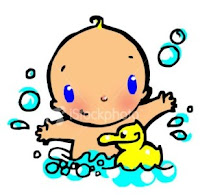
Babies smell naturally wonderful (unless they’re covered in poop). And as far as grooming is concerned, “less is almost always” beneficial for babies. Use products that have few additives and fragrances as possible. Remember, baby skin is very delicate and tender.
Also, choose grooming accessories that do not break easily into parts. You know the babies' moto - if they can pick it up, they can put it in their mouth.
Liquid soap, foam, or baby soap. Though generally cheaper, baby soaps are probably used less these days than its liquid counterpart. Soaps aren’t uniform all throughout and may contain slightly rough surfaces than can scratch baby’s skin. And if you’re not careful on how you grip the soap, your fingernails may scratch the baby’s delicate skin as well. Accidentally dropping the soap might force you to react in a way that can either harm or frighten the baby.
 On the other hand, liquid soaps or foams offer the same cleaning benefits as soaps do but are easier to rinse. And since they are contained in dispensers, you dispense only the amount needed. Most liquid soaps can be used in baby’s hair too.
On the other hand, liquid soaps or foams offer the same cleaning benefits as soaps do but are easier to rinse. And since they are contained in dispensers, you dispense only the amount needed. Most liquid soaps can be used in baby’s hair too.In either form, they have to be used sparingly. Look for a gentle formula and (of course) a trusted brand.
No-tears baby shampoo. If, like my daughter, your baby already has plenty of hairs at birth, you may want to consider a no-tears baby shampoo. Choose a brand that lathers into foam so that it holds and stay put, making it easier to control. Otherwise, the shampoo solution may drip onto baby’s eyes and cause irritation. This may tempt the baby to rub her eyes which can only cause further irritation (unlike adults, babies are not that gentle when it comes to scratching).
 Baby oil. It is usually preferred to keep the baby’s skin dry so as to prevent bacterial and fungal growth. But if the baby’s skin is left dry for too long it may start to flake. Though the baby’s skin normally peels during the first week, excessive peeling can hurt especially if it reddens.
Baby oil. It is usually preferred to keep the baby’s skin dry so as to prevent bacterial and fungal growth. But if the baby’s skin is left dry for too long it may start to flake. Though the baby’s skin normally peels during the first week, excessive peeling can hurt especially if it reddens.Baby oil keeps baby’s skin moisturized and slows down the rate of peeling. It also keeps their skin soft and smooth to the touch.
Also, if you need to gently clean a sticky bowel off a sore bottom, baby oil comes in handy.
Baby powder. Depending on where you live, your baby may not need baby powder at all. Those residing in colder climates may opt to skip using baby powder for their little ones. They think the tendency of babies to sweat is very minimal as compared to those living in warm weather.
 As an astringent, baby powder is used to prevent diaper rash. It also reduces the chances of the baby developing sweat rash along the neck and back area. And as a deodorant, baby powder keeps our little one smelling fresh in between baths.
As an astringent, baby powder is used to prevent diaper rash. It also reduces the chances of the baby developing sweat rash along the neck and back area. And as a deodorant, baby powder keeps our little one smelling fresh in between baths.So if you choose to powder, get one that is corn-based (corn flour). Talc-based powder has a tendency to cause aspiration pneumonia or granuloma if inhaled.
Baby wipes. Wet wipes comes in very handy for diaper changes in places where access to clean running water is impossible (in the car or strolling in the middle of nowhere). It is also effective for hand washing on the go, clean-ups after spit-ups, and dozens of other uses.
Use cotton balls and plain water for cleansing baby's bottom during the first few weeks and whenever diaper rash is a problem. The amount of friction applied when cleaning with baby wipes may only aggravate nasty rashes even more.





No comments:
Post a Comment